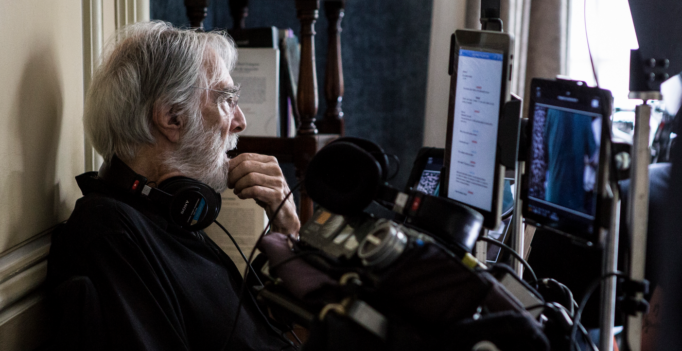In the mid-2000’s, a copy of Caché in a Rogers Video would be my introduction to the works of Michael Haneke, and what an introduction it was. I had heard of a shocking moment in Caché, and I was still unprepared for it. A decade later, I had seen every feature that Haneke had made, always salivating for the next. This is why it was such a shock to me when I was told that, leading up to the release of his most recent film Happy End, I had the opportunity to interview him; the man whose films had led to an infamous pastime among my close circle of friends, appropriately named “screaming about Haneke.”
I didn’t believe that this was happening until I entered that hotel room and found myself by a table with another critic, a translator and him, sitting across the table from me, looking at once like a kindly grandfather and the creator of existential nightmares. That appearance makes perfect sense, as a Haneke film often begins as a family drama and ends in terror.
Happy End, the story of the Laurent family, was inspired by a true family drama. The story of a young Japanese girl who, at the age of 16, murdered her mother by slowly poisoning her and publishing the results of her decline online. Haneke, not having a social media presence, was inspired to research social media for a new screenplay and the discovery of Snapchat led to a new fascination, whose influence can be seen in the first several minutes of this latest feature.
Of course, social media also gives into this sense of dread that pervades so many of Haneke’s works, which he claims comes from not understanding everything, learning about the world in small fragments, which is the sensation that he wishes to capture in his work.
Now, you may remember the Laurent name or have heard that this film is a sequel to Amour: well, don’t you dare call it a sequel! Haneke strongly disagrees with this understanding—although he did also state that he is fine with all interpretations of his work—suggesting that the names are just a result of authorship. Amour was based on a real story in Haneke’s family, when his aunt asked for his help in committing suicide, which he could not offer (she eventually killed herself). Haneke states that the story told in Amour was just one strand of the Happy End story, because he only ever writes about the same family, the family that he knows, believing that all serious authors work from the same mind and always make the same films. Otherwise, you’re either a commercial director or you’re a journalist. I was ensured that he didn’t mean it contemptuously but, frankly, the idea that Haneke was insulting me delighted me to no end.
Before I knew it, our time was up. I was disappointed, but I was still in awe of what I had just gone through. After handshakes and pleasantries, I walked out of that room cool as a cucumber. I grabbed my stuff, signed out and went downstairs, where I could finally strip away the pretense and contact everyone I have ever known to let them know that I had just interviewed Michael Haneke.
**********
Do You Tweet? Follow These Tweeple:
Shahbaz Khayambashi: @Shakhayam





Leave a comment